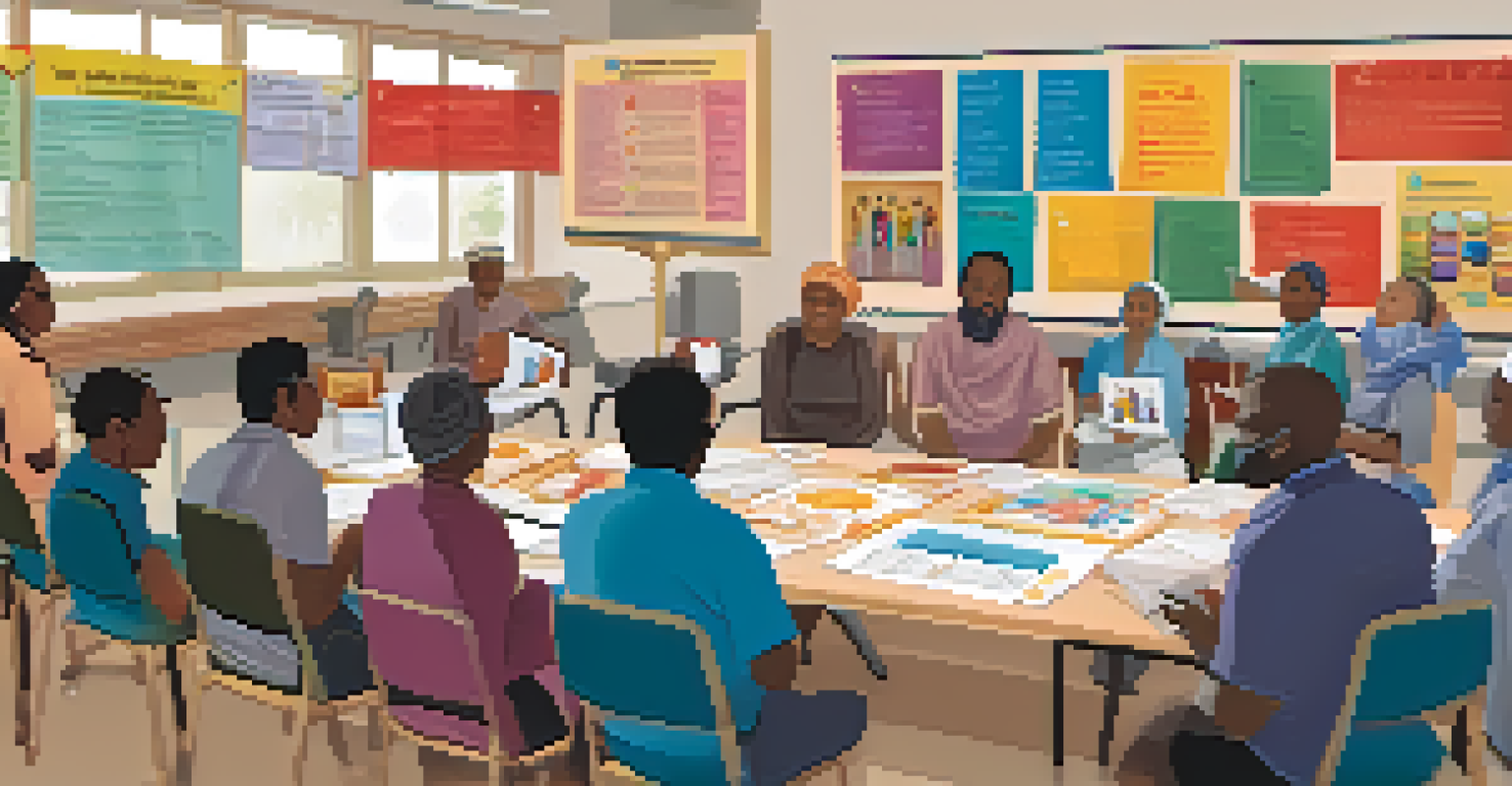Cultural Competence in Epidemiology: Addressing Health Disparities

Understanding Cultural Competence in Health Care
Cultural competence refers to the ability of healthcare providers to understand and respond to the cultural needs of patients. This understanding is crucial in epidemiology, where health disparities often arise due to cultural misunderstandings. By recognizing the diverse backgrounds of patients, healthcare professionals can deliver more effective and personalized care.
Cultural competence is a critical element in delivering effective health care to diverse populations.
For instance, a healthcare provider who understands a patient's cultural beliefs about illness can better communicate treatment options. This not only improves patient satisfaction but can also lead to better health outcomes. In many cases, patients are more likely to engage with healthcare providers who respect and acknowledge their cultural values.
Ultimately, building cultural competence within the healthcare system is essential for addressing the root causes of health disparities. It paves the way for equitable care, ensuring that all individuals have access to the services they need, regardless of their cultural background.
The Role of Epidemiology in Health Disparities
Epidemiology is the study of how diseases affect different populations, and it plays a critical role in identifying health disparities. By analyzing data across various demographic groups, epidemiologists can uncover patterns that indicate why certain populations are disproportionately affected by specific health issues. This knowledge is key to developing targeted interventions.

For example, if data shows that a particular ethnic group has a higher rate of diabetes, public health officials can investigate the social determinants contributing to this trend. Factors like access to healthy foods, socioeconomic status, and cultural attitudes toward health can all play a role. Understanding these elements helps formulate effective prevention strategies.
Cultural Competence Enhances Care
Understanding patients' cultural backgrounds allows healthcare providers to deliver more personalized and effective treatment.
Moreover, epidemiology can guide resource allocation to ensure that vulnerable populations receive the attention they need. By focusing on the specific health challenges faced by these groups, public health initiatives can be more effective and equitable.
Identifying Health Disparities Through Cultural Awareness
To effectively address health disparities, it's essential to identify them first, which requires cultural awareness. By understanding the unique challenges faced by different communities, public health professionals can pinpoint which groups are at higher risk. This awareness can drive the creation of programs tailored to meet those specific needs.
Epidemiology is the cornerstone of public health, providing the data needed to understand health disparities and develop targeted interventions.
For instance, if a community has a high population of immigrants, public health officials might focus on language barriers that prevent access to healthcare. They could then implement translation services or culturally relevant health education programs. These targeted strategies can significantly reduce disparities.
Incorporating cultural competence into public health research and practice allows for a more nuanced understanding of health issues. It encourages a more holistic approach, one that considers not just the biological aspects of health but also the social and cultural factors at play.
Effective Communication in Culturally Diverse Settings
Effective communication is a cornerstone of cultural competence in healthcare. Providers must be able to convey information clearly and respectfully to patients from diverse backgrounds. This involves not only language proficiency but also an understanding of cultural nuances that influence how information is received.
For example, some cultures may prefer indirect communication or value storytelling as a means of sharing information. By adapting their communication styles, healthcare professionals can foster trust and improve the patient-provider relationship. This, in turn, encourages patients to be more open about their health concerns.
Epidemiology Uncovers Health Disparities
By analyzing health data across populations, epidemiologists identify patterns that reveal why certain groups are more affected by specific health issues.
Moreover, effective communication helps to dispel myths and misinformation that can hinder health outcomes. When providers engage in dialogue that respects cultural perspectives, patients are more likely to adhere to treatment plans and participate in preventive measures.
Training Healthcare Professionals in Cultural Competence
Training healthcare professionals in cultural competence is vital for improving health equity. Programs that focus on enhancing understanding of cultural differences can equip providers with the tools they need to deliver better care. Such training often includes workshops, simulations, and continuous education on cultural issues.
For instance, role-playing scenarios can help providers practice responding to patients from various cultural backgrounds. These hands-on experiences can deepen understanding and empathy, leading to improved patient interactions. When healthcare professionals are prepared to address cultural nuances, they can create a welcoming environment.
Furthermore, ongoing education is necessary to keep pace with the ever-changing demographics of communities. As societies become more diverse, healthcare training must evolve to ensure providers are equipped to meet the needs of all patients effectively.
Community Engagement in Addressing Health Disparities
Community engagement is crucial for addressing health disparities effectively. Involving community members in the planning and implementation of health programs ensures that services are relevant and accessible. When communities have a say in their healthcare, they're more likely to embrace initiatives and participate actively.
For example, partnering with local organizations can help identify specific health issues that affect a community. These partnerships can lead to tailored health education campaigns that resonate with residents. Engaging community leaders can also build trust, making it easier for health initiatives to succeed.
Community Engagement Empowers Health
Involving community members in health program planning ensures initiatives are relevant, accessible, and more likely to reduce health disparities.
Moreover, community-driven approaches empower individuals to take charge of their health. When people feel that their voices are heard, they are more likely to engage with healthcare systems, ultimately reducing health disparities and fostering a culture of health.
The Future of Cultural Competence in Epidemiology
Looking ahead, the future of cultural competence in epidemiology is promising yet challenging. As our world becomes increasingly interconnected, healthcare providers must continue to adapt to diverse populations. This evolution requires ongoing commitment to understanding cultural dynamics and addressing health disparities.
Technology also plays a significant role in this future. Telehealth and digital health resources can bridge gaps in access, particularly for underserved communities. However, these tools must be implemented thoughtfully, ensuring they are culturally appropriate and accessible to all.

Ultimately, a collective effort is needed from healthcare systems, policymakers, and communities to foster cultural competence. By prioritizing this approach, we can work towards a healthier future where everyone has the opportunity to thrive, regardless of their cultural background.